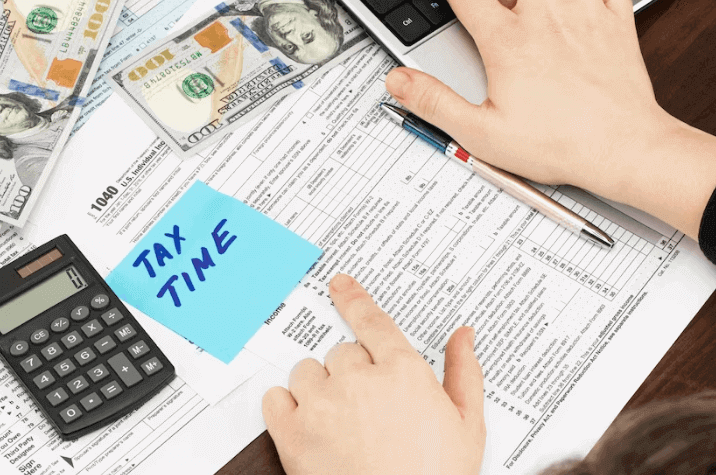As a sole trader, it’s important to understand the concept of tax calculation to ensure that you meet your tax obligations and avoid any penalties or fines. In this article, we’ll provide an overview of tax calculation for sole traders, including the different types of taxes that you may be required to pay, the tax rates that apply, and how to calculate your tax liability.
- Types of Taxes for Sole Traders
- Calculating Your Tax Liability
- Example Calculation
- Your NICs liability Sole Trader and the Concept of Tax Calculation: Deductions and Record Keeping
- Sole Trader and the Concept of Tax Calculation: Payment Deadlines and Penalties
- Sole Trader and the Concept of Tax Calculation: Seeking Professional Advice
- In conclusion,
Types of Taxes for Sole Traders
As a sole trader, you may be required to pay several different types of taxes, including income tax, national insurance contributions (NICs), and value-added tax (VAT).
Income Tax: Sole traders are required to pay income tax on their profits, which is calculated based on their taxable income. Taxable income is calculated by deducting allowable expenses from your total income. Allowable expenses include any expenses that are incurred wholly and exclusively for the purpose of your business, such as office rent, equipment purchases, and travel expenses. Once you’ve deducted your allowable expenses from your total income, you’ll be left with your taxable income, which is then subject to income tax. The current income tax rates for sole traders are:
- 20% on taxable income up to £50,000
- 40% on taxable income between £50,001 and £150,000
- 45% on taxable income over £150,000
National Insurance Contributions (NICs): Sole traders are also required to pay NICs, which are contributions towards your state pension and other benefits. The amount of NICs that you’ll be required to pay will depend on your profits and your age. The current rates for NICs for sole traders are:
- Class 2 NICs – £3.05 per week for profits over £6,515 per year
- Class 4 NICs – 9% on profits between £9,568 and £50,270 per year, and 2% on profits over £50,270 per year.
Value-Added Tax (VAT): Sole traders may also be required to register for VAT if their taxable turnover exceeds the VAT registration threshold, which is currently £85,000 per year. VAT is a tax that is added to the price of goods and services, and is paid by the end consumer. As a VAT-registered sole trader, you’ll need to charge VAT on your sales, and you’ll also be able to reclaim any VAT that you’ve paid on your business purchases. The current VAT rate is 20%.
Calculating Your Tax Liability
To calculate your tax liability as a sole trader, you’ll need to follow these steps:
Step 1: Calculate your total income: Your total income includes all the money that you’ve earned from your business, including sales, fees, and commissions.
Step 2: Deduct your allowable expenses: Deduct all your allowable expenses from your total income to arrive at your taxable income.
Step 3: Calculate your income tax liability: Use the income tax rates above to calculate your income tax liability based on your taxable income.
Step 4: Calculate your NICs liability: Use the NICs rates above to calculate your NICs liability based on your profits.
Step 5: Add your income tax and NICs liability: Add your income tax and NICs liability together to arrive at your total tax liability.
Example Calculation
Let’s say that you’re a sole trader with a total income of £60,000 and allowable expenses of £10,000. Your taxable income would be £50,000 (£60,000 – £10,000). Your income tax liability would be:
- £10,000 x 20% = £2,000 (on the first £50,000 of taxable income)
Your NICs liability Sole Trader and the Concept of Tax Calculation: Deductions and Record Keeping
To minimize your tax liability as a sole trader, it’s important to take advantage of all the deductions that you’re entitled to and keep accurate records of your income and expenses. Here are some deductions that you may be able to claim:
- Office rent: If you rent an office or other business premises, you can deduct the cost of the rent from your taxable income.
- Equipment and supplies: You can deduct the cost of any equipment or supplies that you’ve purchased for your business, such as computers, printers, and stationery.
- Travel expenses: If you travel for business purposes, you can deduct the cost of your transportation, accommodation, and meals.
- Home office expenses: If you work from home, you may be able to deduct a portion of your home expenses, such as rent, utilities, and internet costs.
To claim these deductions, you’ll need to keep accurate records of all your income and expenses. This includes keeping receipts and invoices, maintaining a record of your bank transactions, and keeping a log of your business mileage if you use a vehicle for business purposes. By keeping accurate records, you’ll be able to provide evidence to support your deductions in case of an audit.
Sole Trader and the Concept of Tax Calculation: Payment Deadlines and Penalties
As a sole trader, it’s important to be aware of the payment deadlines for your taxes and to ensure that you pay on time to avoid penalties and interest charges. Here are some important payment deadlines to keep in mind:
- Income tax: Your income tax is due by January 31st following the end of the tax year. For example, if your tax year ends on April 5th, 2022, your tax return and payment will be due on January 31st, 2023.
- National insurance contributions: Your NICs are usually due in two installments, one in January and one in July. However, if your profits are below a certain threshold, you may be able to pay your NICs through your self-assessment tax return.
- Value-added tax: If you’re registered for VAT, you’ll need to submit a VAT return and payment every quarter. The payment deadline is one month and seven days after the end of the quarter.
If you fail to pay your taxes on time, you may be subject to penalties and interest charges. For example, if you fail to submit your self-assessment tax return by the deadline, you may be charged a penalty of £100, even if you don’t owe any tax. If you fail to pay your tax on time, you may be charged interest on the amount owed, as well as penalties for late payment.
Sole Trader and the Concept of Tax Calculation: Seeking Professional Advice
Calculating your taxes as a sole trader can be complex, and it’s important to seek professional advice if you’re unsure about any aspect of your tax obligations. A qualified accountant or tax advisor can help you to understand your tax liabilities, claim all the deductions that you’re entitled to, and ensure that you comply with all the relevant tax regulations.
By seeking professional advice, you can save time and reduce your stress levels by delegating your tax obligations to an expert. This can also help you to avoid any costly mistakes or omissions that could result in penalties or fines.
In conclusion,
As a sole trader, understanding the concept of tax calculation is essential to ensure that you meet your tax obligations and avoid any penalties or fines. By keeping accurate records, claiming all your deductions, and paying your taxes on time, you can minimize your tax liability and focus on growing your business. And if you’re unsure about any aspect of your taxes, don’t hesitate to seek professional advice to ensure that you’re complying with


